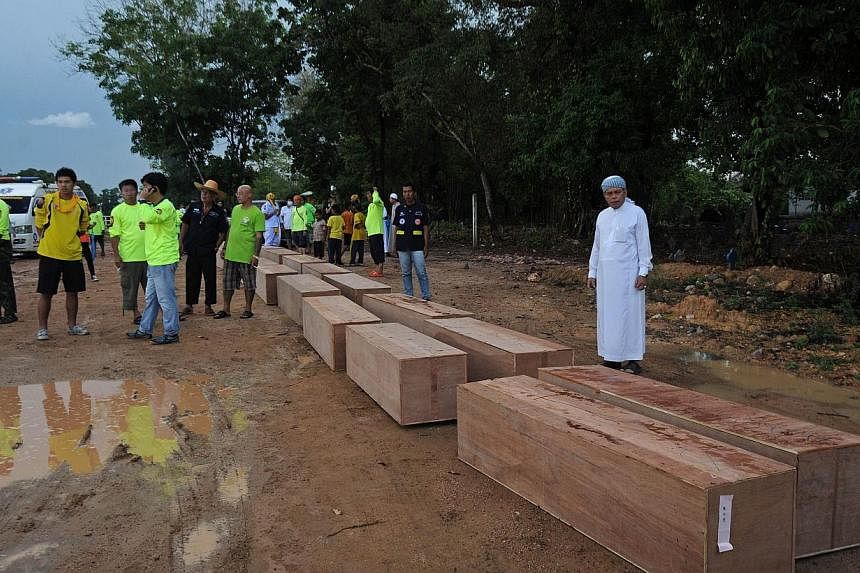THAMMARAT, Thailand (Reuters) - A crackdown on human trafficking networks in Thailand is putting migrants fleeing Myanmar and Bangladesh at more risk as smugglers hold their captives for longer at sea and hide deeper in the jungle, say activists and officials.
Police have found more than 30 bodies, mostly believed to be of stateless Rohingya Muslims from Myanmar, since last Friday after raiding camps in the country's south where migrants were held for ransom under brutal conditions.
But activists and officials say the crackdown is also having an unintended effect: traffickers are taking greater risks to avoid being caught.
The results are conditions of increasing desperation.
"We've been ordered to carry out (a crackdown), and, yes, I admit there may have been some effects," Police Colonel Anuchon Chamat, deputy commander of police in the southern province of Nakhon Si Thammarat, told Reuters.
"Before, the ships would wait for people in Myanmar, and once they were full, would rush over and in four or five days be in Thai waters. But not anymore," he said.
CALL FOR COORDINATED GLOBAL RESPONSE
Late last year Thai officials tightened inspections on roads in the country's south, which for years has been used as a waystation for tens of thousands of Rohingya fleeing Myanmar, mostly on their way to mainly Muslim Malaysia.
It was the discovery of about 100 Rohingya in a convoy in January that led to the unraveling of the network allegedly behind the mass graves, Anuchon said.
But the crackdown has also spooked traffickers into splitting migrants into smaller groups, and keeping them on the move between camps, said Chris Lewa of the Arakan Project, which plots migration across the Bay of Bengal.
Other traffickers have responded by keeping thousands of migrants for weeks or months at a time in ships before being moved to land, said Lewa, whose organisation interviews migrants and smugglers.
Thailand has been stung in the past by criticism, including from the United States, that it is not doing enough to fight trafficking.
An official from the US embassy in Bangkok told Reuters that Washington was concerned about "reports of thousands of additional migrants on land and at sea in boats and ships", and called for a "coordinated international effort" to address the issue.
Thailand on Friday called for a meeting with Myanmar and Malaysia to try to resolve the crisis.
As Thai police press on with their raids - which have uncovered three recently abandoned camps in the last week - conditions will likely get worse, Lewa added. "Thailand is trying to show off to the US that they are doing something but it's putting the Rohingya in greater jeopardy," she said.
More than 50 police officers have been transferred over suspected involvement in the trade.
"SECURITY VERY TIGHT"
Trafficking victims interviewed by Reuters described criminal networks that appeared under stress from authorities, resulting in dire conditions for those caught up in their web.
Muhammad Solim, a Rohingya previously living as a refugee in Bangladesh, said he spent nearly three months at sea and 90 days in a jungle camp before he was ransomed for the equivalent of US$2,240 (S$2,980), paid in baht and ringgit.
Solim, 20, said his ship waited in Thai waters for 15 days after spending about two months off Bangladesh waiting for passengers. In cramped conditions, two died and were thrown overboard. "The guards on the boat told us security was very tight, we cannot go (ashore)," he said.
After landing on the southern Thai coast, Solim said the roughly 400 migrants were marched 24 hours to a jungle camp.
A 13-year-old Rohingya boy told Reuters he had spent three months at sea - including a month off Thailand - before entering the jungle camps.
Guards told the boy, too, that they feared encountering Thai authorities if they land, he said.

